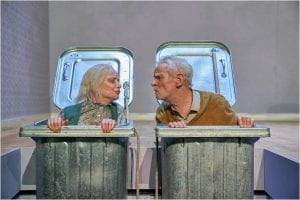By Dr Isabel Stowell-Kaplan
A: So … What is the likelihood that we will get to see Endgame? 😢
B: Yeah […]
[Edited to omit various conversations about tension headaches, cancelled plans and working from home]C: Yes, sadly I think Endgame’s gonna be a no go …😔 I actually think the Old Vic will be closed from next week as it seats over 500.
This conversation is from mid-March and already it feels quaint and impossibly distant.
Having made a return to the U.K. to take up my Marie Curie Research Fellowship at Bristol after ten years abroad, I was looking forward to returning to friends and to the theatre – ideally in combination. I’d made plans to see Endgame (dir. Richard Jones) at the Old Vic, quickly reviving a tried, if not quite trusted, practice for theatrical selection: one of us would pick a show and the others had to see it.
Though it does sound simple enough, the fact that the five of us have wildly different theatrical tastes has made for a kind of dramatic Russian Roulette over the years. We all saw things we wouldn’t otherwise – good and bad – and we had dinner and drinks to talk about it. You know, everything we all did before lockdown. This time it was Endgame, chosen likely as much for Alan Cumming as for Samuel Beckett. I have vague memories of seeing him on a different outing, that time upside down in a skirt at the Lyric, Hammersmith.
In any case, I don’t need to tell you that Endgame was of course cancelled, the Old Vic was closed, everything was closed.
Some time later I received an e-mail from the Old Vic announcing that for those still with tickets for dates unplayable, they would be screening the archive recording. For me, the fact that the Beckett Estate – an estate with such an ‘iron grip’ on Beckett’s work that they had, in 1994, prevented a production of Footfalls from touring to Paris because Fiona Shaw had roamed further than the stage directions allowed or who, in 2006, issued an injunction against an Italian theatre to stop the ‘use of female actors in the two main roles’ of Waiting for Godot (‘Beckett Estate Fails to Stop Women Waiting for Godot’) – had granted permission for the theatre to screen the show, underlined the extraordinary nature of these times. These were the (dramatic) End(game) times indeed.
And so, despite some concerns that watching Endgame right now might be a little too ‘on the nose,’ we agreed to watch it online together and all settled down to do just that.

Watching Endgame in lockdown was a revelation; and not simply because I was watching a play in a post-apocalyptic landscape peopled by characters who seemingly cannot leave each other and rarely leave the room, or, in the case of Nell and Nagg, their bins. ‘New Tory policy?…’ asked friend ‘B’ over text.
It was more that what had previously felt like a strange, though affecting, exercise in postmodern nihilism, suddenly felt … immediate. The striking darkness of Hamm’s demand, ‘Put me in my coffin,’ for instance, answered simply, ‘There are no more coffins,’ seemed suddenly to foreshadow a desperate COBRA meeting of 2021. What is more, Beckett’s careful attention to the minute and even mundane elements of life were no longer remote or abstract but tangible and proximate. It was as though someone had accidentally pulled the world’s focus and Beckett’s mirror (up to nature) no longer reflected obliquely but directly. Take this:
HAMM (irritably): What’s wrong with your feet?
CLOV: My feet?
HAMM: Tramp! Tramp!
CLOV: I must have put on my boots.
HAMM: Your slippers were hurting you? (Pause.)
This line has always seemed witty and wry but also strange and obscure. In lockdown 2020 it simply rang true. In a world where you can’t leave your home, you might just as well change into your boots (and forget having done so) because ‘your slippers were hurting you.’ Similarly, this:
HAMM: You haven’t put on his ribbon.
CLOV (angrily): But he isn’t finished, I tell you! First you finish your dog and then you put on his ribbon!
Hamm and Clov’s commitment to catastrophic-era crafting would make Kirstie Allsop proud. Moreover, Clov’s angry insistence that Hamm doesn’t understand the order of things – in big or small ways – reflects the frustrations of so many locked-down and locked-in relationships.
Similarly, watching Clov’s ritualistic navigation of his delimited space – up and down and up and down the ladder to the exceedingly high windows – made a new kind of sense. Clov’s methodical commitment to his repetitive tasks chimed with a newfound awareness of our own cyclical routines.

Credit: The Old Vic Theatre.
As our recurring activities – opening *our* windows, making dinner, taking daily exercise – have gained an oversized importance, Clov’s weary but unvarying commitment to his own became relatable in a way I never expected. I feel echoes of Clov’s careful self-choreography every time I open the door. Indeed, taking my government-sanctioned daily exercise, feels increasingly like a high-stakes rehearsal for Beckett’s 1980s television play, Quad: a choreographed ‘dance’ in which actors cross the stage at regular intervals, walking carefully-defined paths and never touching.
Though my original plans to see Endgame at the Old Vic were frustrated – a part of that outside world we none of us can reach – the archival recording, played at home in these strange times, enabled me, to paraphrase Kent’s famous exhortation, to ‘see [it] better.’ For me, to view Endgame in these end times helped to make new sense of the Endgame and the (End) times.
